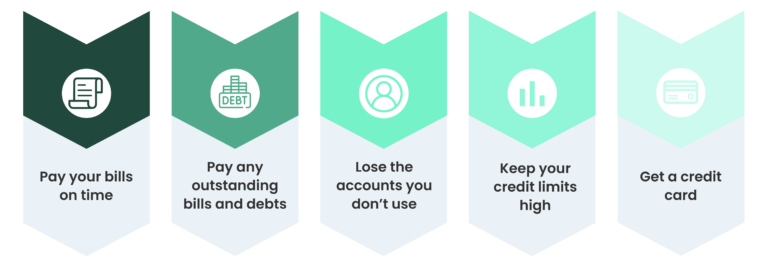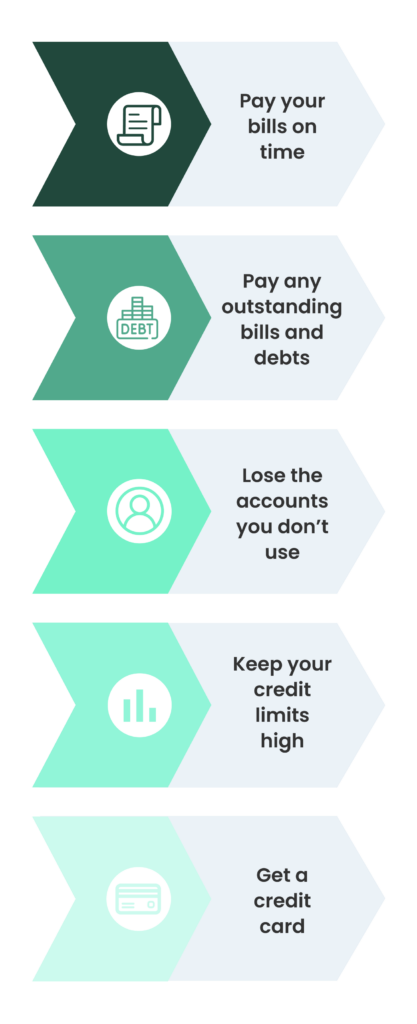How to get a sparkling credit score
5 min read


Living without debt is great – who actually wants to take on debt? A lot of people, it turns out. While we generally do our best to avoid debt (which is the right thing to do) we actually need to take on a bit of debt to achieve important life goals like owning a house!
Why is this? It’s all tied to our credit scores. Without debt, we have no credit scores and without credit scores, we can’t access credit and loans…which put us in debt. It all sounds like cruel irony, but having a good credit score can open doors and opportunities we wouldn’t otherwise have. The key is to have a good credit score backing you.
Why Is Having A Good Credit Score Important?
Before agreeing to lend you any money, banks and credit institutions need to see that you’re in decent financial shape first – they essentially want to take a look at your spending habits and history to get an idea of how you manage your money. They do this by looking at your credit score.
A credit score is a weighted score assigned to you by a bank or credit bureau that tells them how much of a risk you are when it comes to loans. Your credit score plays a big role in determining whether or not you’ll be able to access any sort of significant loan, like a home loan.
It’s important to have a good credit score on your side when you apply for any sort of loan because it allows financial institutions to see that you’re responsible with your money management and won’t pose a high risk of defaulting on any loan repayments offered by them to you.
The higher your credit score, the better your chances are of getting a home loan and other kinds of loans. It also puts you in a better bargaining position for getting the loan amount you want as well as a more favourable interest rate.
In short, having a good credit score makes life a lot easier for you if you’re looking to get a loan or buy a house.
How Is Your Credit Score Calculated?
A registered credit bureau will compile and assign you a credit score. They’ll calculate your score based on several different metrics:
- The types of accounts you own and how long they’ve been open.
- Your debt repayment history.
- Outstanding amounts you owe.
- Different types of credit you have applied for and how often you’ve applied.
- How much of your available credit limit you are using.
- Your history of payment defaults or missed payments, as well as incidents that resulted in bankruptcy or legal action that was taken against you.
Based on this information, the credit bureau will assign you a three-digit score number between 0 and 999.
- 670 and higher – excellent score.
- 650 – 669 – good score.
- 634 – 649 – average score.
- 618 – 633 – below average.
- Below 618 – poor score.
You need a score of at least 600 to qualify for a home loan application. Keep in mind that different credit bureaus may use different scoring systems, so your credit score number may differ between two service providers, but it will be in line with their grading system.
How To Improve Your Credit Score
If you’re like most people, seeing those credit score figures is a little intimidating! Thankfully, your credit score isn’t fixed and there’s a lot you can do to actively improve your credit score rating. Here are some ways how:
Pay your bills on time
Paying any incoming bills on time will help to increase your credit score. It shows creditors that you honour your financial commitments and contracts which is a big thumbs up in their eyes. Whether it’s rent, water, electricity, rates, or a cellphone contract, always try to pay them on time – it will pay off in the long run!
Pay any outstanding bills and debts
Don’t worry if you fall behind on or miss a payment, we’ve all been there! Just pay the outstanding balance as soon as you can to get back on track. Any debt you have outstanding will count against you when creditors look at your background. Pay off your debts as quickly as possible by making regular payments on time.
This shows you’re capable of managing your finances responsibly. Don’t just pay the minimum instalments, that looks like you’re avoiding paying what you owe – always pay more to show credit agencies you’re actively working to pay off your debts.
Lose the accounts you don’t use
It might seem like a good idea to open multiple store credit accounts to show creditors that you’re more than capable of paying off your debts – but this can actually backfire. Having too many credit accounts linked to your name can make you look like more of a credit risk than less.
Avoid opening too many credit accounts around the same time because creditors will likely view it as you being desperate to access lines of credit, which is not good! Take a look at the current accounts you have open. Select which ones you want to close and pay off any outstanding amounts first. The less credit you’re linked to, the lower your risk.
Keep your credit limits high
Again, it sounds totally counterintuitive to keep your credit limits high when you want to appear as a lower credit risk. Why not just lower your credit limits? The key here is to keep your credit limits high and your credit repayments low. Having a wide dearth between your credit limit and what you owe looks good on paper – it shows you aren’t spending too much of your overall credit limits.
Get a credit card
Applying for a credit card can help you to build a good credit score if it’s used responsibly and for the right reasons. However, you should only take on a credit card after doing some careful thinking. A credit card is a big responsibility and also comes with a lot of fees, so be sure you’re ready to take on a credit card before signing up for one.
Make sure you don’t max out your credit card and pay back what you owe on time. It’s also a good idea to limit the amount of credit you access on your card to no more than 30% of the total amount.
That means you shouldn’t take on debt that’s more than 30% of your credit limit, so choose your credit purchases carefully and make sure you can afford to pay them back at the end of the month.
If you decide that a credit card is not for you, that’s absolutely fine. There are plenty of other ways you can build good credit without using a credit card.
How Long Does It Take For Your Credit Score To Improve?
If you’re in the process of making improvements to your credit score or want to improve it, you’ll want to know how much time it will take before you start seeing results.
On average, it takes around 3 months of good credit habits before your score will start to improve. If you’re reapplying for a loan, it’s recommended that you wait around 6 months for your score to improve first.
Are you ready to get the cred you’ve always wanted? Now you know how. Stay tuned for more money hacks we’ll be dropping soon. Spot you later.
The content provided in this article is provided as general information. It is not intended as nor does it constitute financial, tax, legal, investment, or other advice. We accept no responsibility from any loss arising as a result of your reliance on information contained in this article, any related communication or on our app.